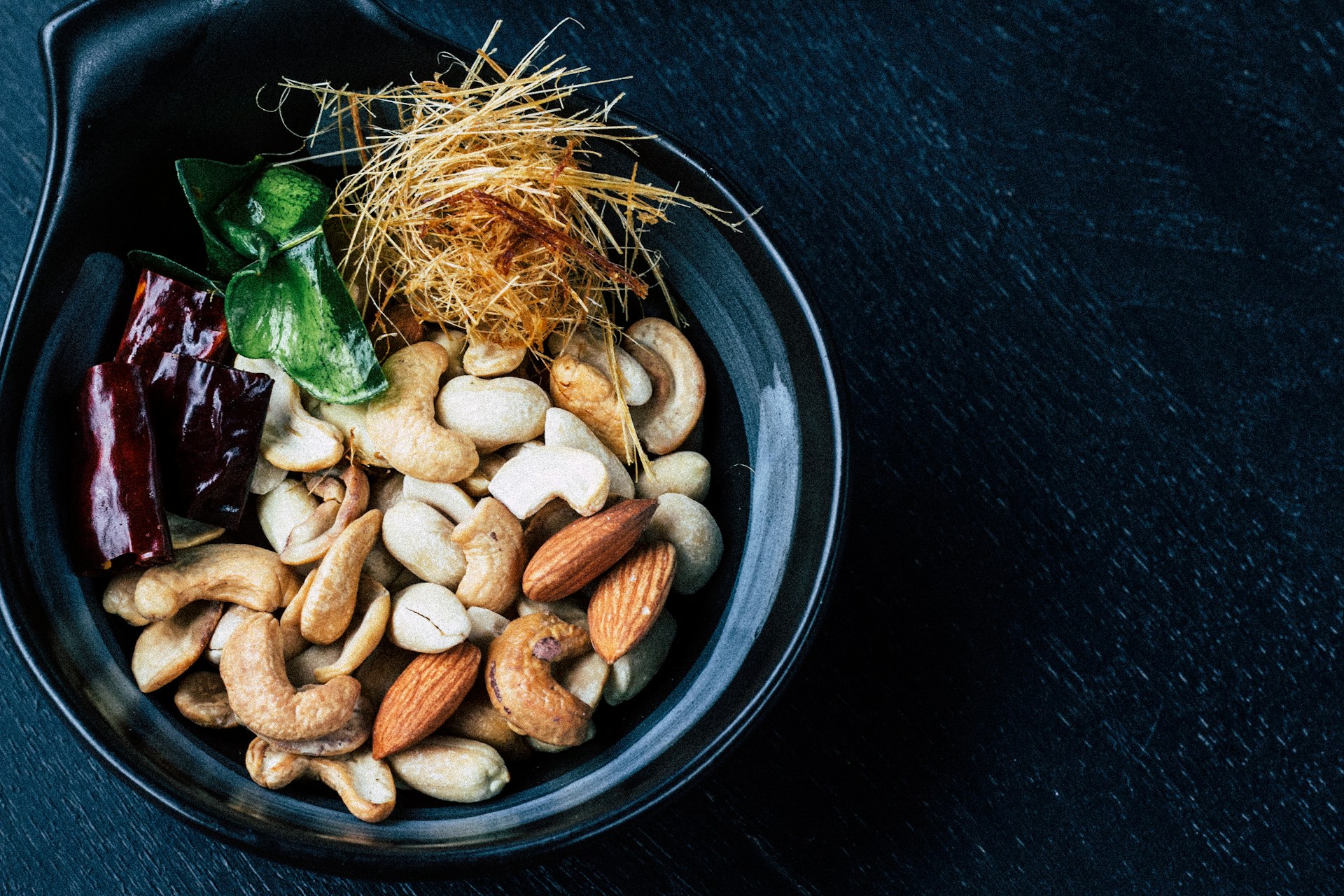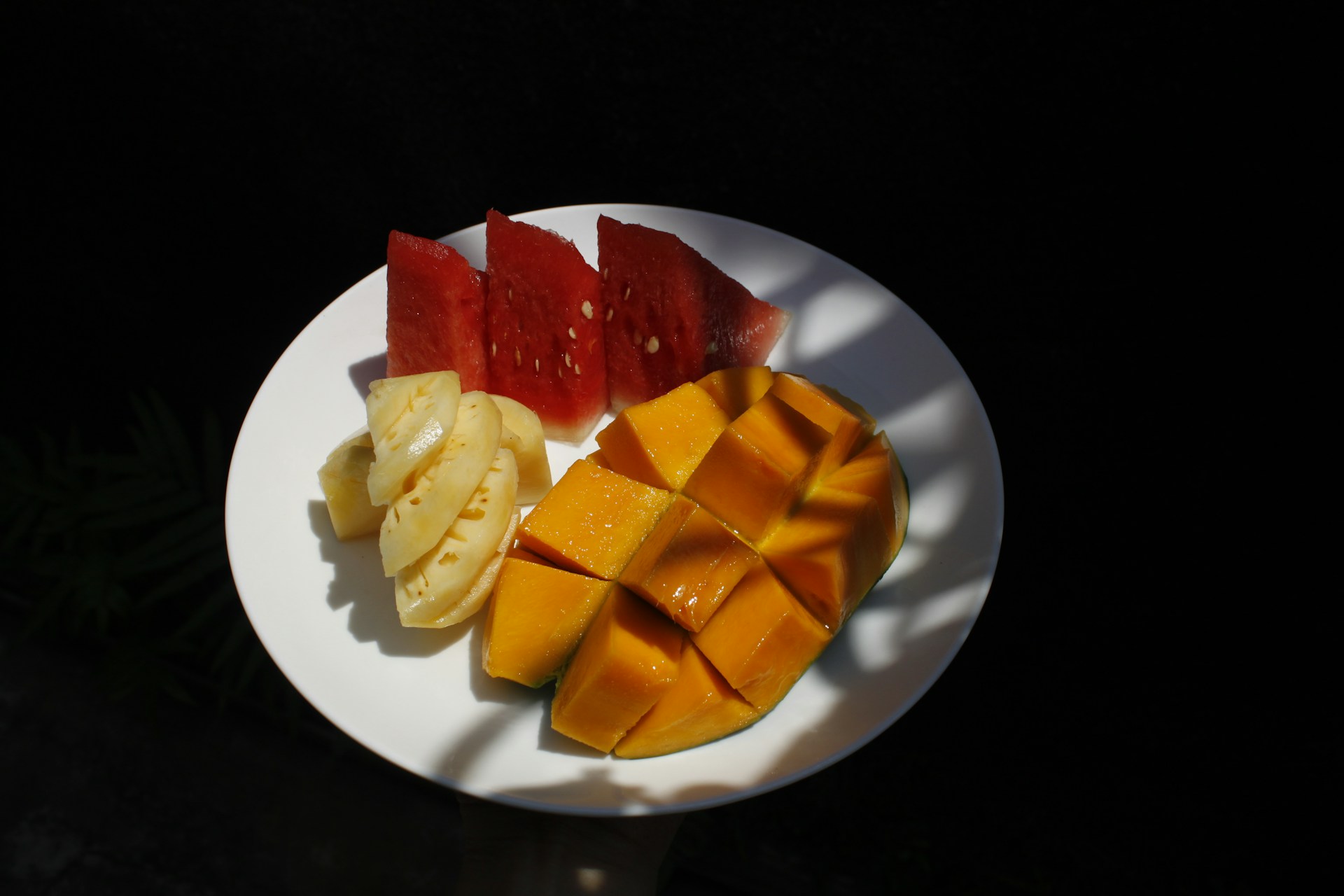The Potential Benefits and Mechanism of Action of Tropical Nuts Against Metabolic Syndrome: A Literature Review
Potensi dan Mekanisme Kacang Tropis terhadap Sindrom Metabolik: Tinjauan Literatur

Downloads
Background: Metabolic syndrome is a significant risk factor for both type 2 diabetes mellitus and cardiovascular disease, with a high prevalence in Asia Pacific, particularly in Indonesia. To reduce its prevalence, several studies have recommended the use of tropical nuts, which can be developed as functional foods and complementary treatment. In this context, the bioactivities of tropical nuts can largely be attributed to their rich content of monounsaturated fatty acids, polyunsaturated fatty acids, fiber, minerals, vitamins, phytosterols, and polyphenols.
Objectives: This literature review aims to evaluate the potential benefits and mechanism of action of tropical nuts against metabolic syndrome.
Methods: The study design was a literature review of several articles from 3 online databases, including PubMed, Google Scholar, and ScienceDirect.
Discussions: The results showed that tropical nuts (peanut, sacha inchi, cashew, tropical almond, and Brazil nut) had several biologically active components, such as arginine, fiber, fatty acid, mineral, vitamin, phenolic compounds, resveratrol, and phytosterol. The test samples were reported to have the ability to modulate Nrf2, SOD, MDA, GSH, GPx, and CAT due to their antioxidant activity. In inflammation, tropical nuts had a significant effect on NF-κB, NLRP3, TNF-ɑ, IL-8, IL-1ꞵ, IL-6, and IL-10. The results also showed their ability to enhance lipid synthesis, nitric oxide production, advanced glycation end-product, prostaglandin, SIRT3, homocysteine, protein kinase C, adhesion molecules, platelet aggregation, GLP-1, PYY, AGRP, PPARɑ/ꞵ/δ, GLUT4, and insulin receptor.
Conclusions: Tropical nuts had beneficial effects on metabolic syndrome due to their bioactivities, including antioxidants, anti-inflammatory, anti-obesity, antidiabetic, antihypertensive, anti-dyslipidemia, and cardioprotective.
INTRODUCTION
Metabolic syndrome (MetS) is a widely recognized risk factor that increases the possibility of experiencing type 2 diabetes mellitus (T2DM) and cardiovascular disease (CVD). This condition is characterized by high blood pressure, elevated fasting glucose, and low high-density lipoprotein (HDL) cholesterol. According to WHO, the percentage of individuals in most Southeast Asian countries suffering from elevated blood glucose and blood pressure is higher compared to the United States and the United Kingdom. In addition, the prevalence of metabolic syndrome in Asia Pacific ranges from 11.9% to 37.1%, with Herningtyas and Ng reporting an average value of 21.66% in Indonesia1. Recent studies showed that its prevalence in China reached 31.1% for individuals aged ≥ 20 years and 24.4% for those aged ≥ 15 years in Indonesia2;3.
According to several studies, the underlying cause of metabolic syndrome is the imbalance between caloric requirements and intake4. In this context, overeating, lack of physical activity, as well as genetic and epigenetic factors have been reported to be significant contributors to the imbalance. Genetic and epigenetic factors can affect body mass index, waist circumference, abdominal visceral fat, HDL-C, triglycerides (TG), insulin, glucose, and blood pressure. A recent study also showed that insulin resistance, visceral adiposity, and chronic inflammation are significant triggers with the potential to activate metabolic syndrome and its progression to CVD and T2DM5. Insulin resistance in fat tissue triggers the mobilization of Free Fatty Acids (FFA)6, which inhibits insulin's effect on fat and triggers lipolysis, leading to increased FFA production. In addition, these fatty acids can reduce muscle glucose uptake and induction of gluconeogenesis and lipogenesis in the liver. In the pancreas, FFA inhibits insulin release but is metabolized by the liver into TG, which some transforming into VLDL7. Insulin resistance is known to trigger the sympathetic nervous system, leading to increased regulation of angiotensin II receptors and reduced synthesis of Nitric Oxide (NO), a vasodilator5. Individuals with obesity typically experience increased renal tubular reabsorption, causing sodium retention and hypertension8. Building on this idea, proinflammatory cytokines inhibit insulin signal transduction, causing resistance in the liver, skeletal muscle, and adipose tissue9.
In line with these results, nutrition is the most influential risk factor for various diseases and early mortality10. For example, pathological disorders, such as hypertension, hypercholesterolemia, obesity, and inflammation are influenced by dietary patterns. In addition, Reactive Oxygen Species (ROS) in the mitochondria are produced in excess when diets heavy in fat and/or sugar are consumed, leading to insulin resistance caused by oxidative stress11.
Previous reports have shown that the tropics cover approximately 36% of the world's land area, with 30% of the total population living in the region. In addition, tropical foods have the prospect of being developed as functional foods and complementary treatment for metabolic due to their phytochemicals, fiber, minerals, vitamins, and macronutrients content12. A typical example of tropical foods is nuts, which have been reported to be rich in bioactive compounds, monounsaturated fatty Acids (MUFAs), and polyunsaturated fatty Acids (PUFAs). Nuts also contain fiber, minerals, vitamins, phytosterols, polyphenols13, and relatively high protein. Building on this idea, several systematic reviews have been conducted to assess their nutritional benefits and bioactivities. For example, Nunes, et.al. extensively discussed peanuts14, while15explored almonds, cashews, hazelnuts, peanuts, pecans, pistachios, and walnuts15. A review by Eslami, et.al. also discussed the potential of nuts related to risk factors for metabolic syndrome but did not address any particular species16. Despite the existing literature, there is no information on nuts that grow in tropical areas. Therefore, this review aims to evaluate the potential benefits and mechanism of action of tropical nuts against metabolic syndrome. The results are expected to facilitate the development of further studies on tropical nuts and prompt their commercial cultivation. These efforts are anticipated to provide insights into their health benefits, particularly in tropical countries, such as Indonesia.
METHODS
A literature review was conducted from January- February 2024 by searching published literature related to tropical nuts and their potential benefits in metabolic syndrome. This was achieved by retrieving data from journals published from 2014 to 2024. Preferred Reporting Items for Systematic Reviews and Meta- Analyses (PRISMA) Statement was used during articles selection process. In addition, the search procedures were carried out using 3 databases, including Google Scholar, PubMed, and Science Direct. The search keywords were “metabolic syndrome”, “diabetes”, “dyslipidemia”, “hypertension”, “inflammation”, “oxidative stress”, “glucose”, “insulin”, “HDL”, “LDL”, “triglyceride”, “cholesterol”, “peanut”, “sacha inchi”, “tropical almond”, “cashew”, “Bertholletia excelsa”. The inclusion criteria were 1) articles on nuts grown in tropical areas and their effect on metabolic syndrome and related conditions, 2) published in the last 10 years, 3) available in full text, 4) clinical, pre-clinical, or in vivo studies with human or animal subjects, and 5) published in peer- reviewed journals. The process was limited to articles published in English and Indonesian languages. After duplicates were removed, the remaining were evaluated for inclusion criteria and eligibility, totaling 1056 articles. In the first step, articles published more than 10 years ago, reviews, abstracts only, other than journal articles, and paid articles were excluded. In the second stage, those concerning sections other than nuts seed or kernel (such as root, leaves, bark, etc.), did not have parameters related to metabolic syndrome, did not have significant
Herningtyas, E. H. & Ng, T. S. Prevalence and distribution of metabolic syndrome and its components among provinces and ethnic groups in Indonesia. BMC Public Health 19, 377 (2019).
Dwi Yulianto, M. F., Miko Wahyono, T. Y. & Helda, H. Sindrom Metabolik dan Kejadian Stroke pada Penduduk Berusia ≥ 15 Tahun di Indonesia: Analisis Data Riskesdas 2018. Jurnal Epidemiologi Kesehatan Indonesia 7, 59 (2023).
Yao, F. et al. Prevalence and Influencing Factors of Metabolic Syndrome among Adults in China from 2015 to 2017. Nutrients 13, 4475 (2021).
Glosse, P. et al. A high-fat diet stimulates fibroblast growth factor 23 formation in mice through TNFα upregulation. Nutr & Diabetes 8, 36 (2018).
Fahed, G. et al. Metabolic Syndrome: Updates on Pathophysiology and Management in 2021. Int J Mol Sci 23, 786 (2022).
Rochlani, Y., Pothineni, N. V., Kovelamudi, S. & Mehta, J. L. Metabolic syndrome: pathophysiology, management, and modulation by natural compounds. Therapeutic Advances in Cardiovascular Disease 11, 215–225 (2017).
Adeli, K., Taghibiglou, C., Van Iderstine, S. C. & Lewis, G. F. Mechanisms of Hepatic Very Low-Density Lipoprotein Overproduction in Insulin Resistance. Trends in Cardiovascular Medicine 11, 170–176 (2001).
Katsimardou, A. et al. Hypertension in Metabolic Syndrome: Novel Insights. CHYR 16, 12–18 (2020).
Ahmed, M. et al. Metabolic syndrome; Definition, Pathogenesis, Elements, and the Effects of medicinal plants on it’s elements. J Diabetes Metab Disord 21, 1011–1022 (2022).
Devries, S. et al. A deficiency of nutrition education in medical training. Am J Med 127, 804–806 (2014).
García-García, F. J., Monistrol-Mula, A., Cardellach, F. & Garrabou, G. Nutrition, Bioenergetics, and Metabolic Syndrome. Nutrients 12, 2785 (2020).
John, O. D., Du Preez, R., Panchal, S. K. & Brown, L. Tropical foods as functional foods for metabolic syndrome. Food Funct. 11, 6946–6960 (2020).
Salas-Salvadó, J., Guasch-Ferré, M., Bulló, M. & Sabaté, J. Nuts in the prevention and treatment of metabolic syndrome. The American Journal of Clinical Nutrition 100, 399S-407S (2014).
Nunes, Y. C. et al. Peanut (Arachis hypogaea L.) seeds and by-products in metabolic syndrome and cardiovascular disorders: A systematic review of clinical studies. Phytomedicine 123, 155170 (2024).
Bauset, C. et al. Nuts and Metabolic Syndrome: Reducing the Burden of Metabolic Syndrome in Menopause. Nutrients 14, 1677 (2022).
Eslami, O. et al. Effect of nuts on components of metabolic syndrome in healthy adults with overweight/obesity: A systematic review and meta-analysis. Nutrition, Metabolism and Cardiovascular Diseases 32, 2459–2469 (2022).
Rosengarten Jr., F. The Book of Edible Nuts. (Dover Publication, Inc., New York, USA, 1984).
Kennard, W. C. & Winters, H. F. Some Fruits and Nuts for the Tropics. (Goverment printing office, Washington DC, USA, 1960).
Nayak, S. N. et al. Profiling of Nutraceuticals and Proximates in Peanut Genotypes Differing for Seed Coat Color and Seed Size. Front. Nutr. 7, 45 (2020).
U.S. Department of Agriculture. FoodData Central. (2021).
Lozano, M. G., De Oliveira Sartori, A. G., Markowicz Bastos, D. H. & Bismara Regitano‐d’Arce, M. A. Selected nutrients and antinutrients in peanut cultivars harvested in Brazil. J Sci Food Agric 99, 5334–5340 (2019).
Win, M. M., Abdul-Hamid, A., Baharin, B. S., Anwar, F. & Saari, N. Effects of roasting on phenolics composition and antioxidant activity of peanut (Arachis hypogaea L.) kernel flour. Eur Food Res Technol 233, 599–608 (2011).
Awad, A. B., Chan, K. C., Downie, A. C. & Fink, C. S. Peanuts as a source of beta-sitosterol, a sterol with anticancer properties. Nutr Cancer 36, 238–241 (2000).
Souza, A. H. P. D. et al. Sacha inchi as potential source of essential fatty acids and tocopherols: multivariate study of nut and shell - doi: 10.4025/actascitechnol.v35i4.19193. Acta Sci. Technol. 35, 757–763 (2013).
Sethuraman, G. et al. Nutrition Composition of Sacha Inchi (Plukenetia volubilis L.). IJRSI 7, 271–277 (2020).
Gutiérrez, L. F., Rosada, L. M. & Jiménez, Á. Chemical composition of Sacha Inchi (Plukenetia volubilis L.) seeds and characteristics of their lipid fraction. Grasas y Aceites 62, 76–83 (2011).
Bueno-Borges, L. B. et al. Sacha inchi seeds from sub-tropical cultivation: effects of roasting on antinutrients, antioxidant capacity and oxidative stability. J Food Sci Technol 55, 4159–4166 (2018).
Kim, D.-S. & Joo, N. Feasibility of Elder-Friendly Food Applications of Sacha Inchi According to Cooking Method: Focusing on Analysis of Antioxidative Activity and Brain Neuron Cell Viability. Foods 10, 2948 (2021).
Srichamnong, W., Ting, P., Pitchakarn, P., Nuchuchua, O. & Temviriyanukul, P. Safety assessment of Plukenetia volubilis (Inca peanut) seeds, leaves, and their products. Food Science & Nutrition 6, 962–969 (2018).
Wang, S., Zhu, F. & Kakuda, Y. Sacha inchi ( Plukenetia volubilis L.): Nutritional composition, biological activity, and uses. Food Chemistry 265, 316–328 (2018).
Rico, R., Bulló, M. & Salas‐Salvadó, J. Nutritional composition of raw fresh cashew ( Anacardium occidentale L.) kernels from different origin. Food Science & Nutrition 4, 329–338 (2016).
Wojdyło, A., Turkiewicz, I. P., Tkacz, K., Nowicka, P. & Bobak, Ł. Nuts as functional foods: Variation of nutritional and phytochemical profiles and their in vitro bioactive properties. Food Chemistry: X 15, 100418 (2022).
Venkatachalam, M. & Sathe, S. K. Chemical Composition of Selected Edible Nut Seeds. J. Agric. Food Chem. 54, 4705–4714 (2006).
Ng, S., Lasekan, O., Muhammad, K. S., Hussain, N. & Sulaiman, R. Physicochemical properties of Malaysian-grown tropical almond nuts (Terminalia Catappa). J Food Sci Technol 52, 6623–6630 (2015).
Monnet, Y. T., Gbogouri, A., Koffi, P. K. B. & Kouamé, L. P. Chemical characterization of seeds and seed oils from matureTerminalia Catappa fruits harvested in Côte d’Ivoire. Int. J. Biosci. 2, 110–124 (2012).
Katiki, L. M. et al. Terminalia Catappa : Chemical composition, in vitro and in vivo effects on Haemonchus contortus. Veterinary Parasitology 246, 118–123 (2017).
Christian, A. & . M. E. U. Nutritional Potential of the Nut of Tropical Almond (Terminalia Catappia L.). Pakistan J. of Nutrition 5, 334–336 (2006).
Cardoso, B. R., Duarte, G. B. S., Reis, B. Z. & Cozzolino, S. M. F. Brazil nuts: Nutritional composition, health benefits and safety aspects. Food Research International 100, 9–18 (2017).
Colpo, E. et al. Brazilian nut consumption by healthy volunteers improves inflammatory parameters. Nutrition 30, 459–465 (2014).
Böger, R. H. et al. Dietary L -Arginine Reduces the Progression of Atherosclerosis in Cholesterol-Fed Rabbits: Comparison With Lovastatin. Circulation 96, 1282–1290 (1997).
Bajic, Z. et al. Homocysteine, Vitamins B6 and Folic Acid in Experimental Models of Myocardial Infarction and Heart Failure-How Strong Is That Link? Biomolecules 12, 536 (2022).
Li, X. et al. Short- and Long-Term Effects of Wholegrain Oat Intake on Weight Management and Glucolipid Metabolism in Overweight Type-2 Diabetics: A Randomized Control Trial. Nutrients 8, 549 (2016).
Palomer, X., Pizarro-Delgado, J., Barroso, E. & Vázquez-Carrera, M. Palmitic and Oleic Acid: The Yin and Yang of Fatty Acids in Type 2 Diabetes Mellitus. Trends in Endocrinology & Metabolism 29, 178–190 (2018).
Flieger, J., Flieger, W., Baj, J. & Maciejewski, R. Antioxidants: Classification, Natural Sources, Activity/Capacity Measurements, and Usefulness for the Synthesis of Nanoparticles. Materials 14, 4135 (2021).
Xie, C. et al. Regional Difference in the Association between the Trajectory of Selenium Intake and Hypertension: A 20-Year Cohort Study. Nutrients 13, 1501 (2021).
Alehagen, U., Johansson, P., Svensson, E., Aaseth, J. & Alexander, J. Improved cardiovascular health by supplementation with selenium and coenzyme Q10: applying structural equation modelling (SEM) to clinical outcomes and biomarkers to explore underlying mechanisms in a prospective randomized double-blind placebo-controlled intervention project in Sweden. Eur J Nutr 61, 3135–3148 (2022).
Kim, J. E. et al. Selenium Significantly Inhibits Adipocyte Hypertrophy and Abdominal Fat Accumulation in OLETF Rats via Induction of Fatty Acid β-Oxidation. Biol Trace Elem Res 150, 360–370 (2012).
Park, S. et al. Inhibitory Effect of Arachis hypogaea (Peanut) and Its Phenolics against Methylglyoxal-Derived Advanced Glycation End Product Toxicity. Nutrients 9, 1214 (2017).
Lopes, R. M., Agostini-Costa, T. D. S., Gimenes, M. A. & Silveira, D. Chemical Composition and Biological Activities of Arachis Species. J. Agric. Food Chem. 59, 4321–4330 (2011).
Rossi, Y. E. et al. Polyphenols of peanut (Arachis hypogaea L.) skin as bioprotectors of normal cells. Studies of cytotoxicity, cytoprotection and interaction with ROS. Journal of Functional Foods 67, 103862 (2020).
Grassi, D. et al. Blood pressure is reduced and insulin sensitivity increased in glucose-intolerant, hypertensive subjects after 15 days of consuming high-polyphenol dark chocolate. J Nutr 138, 1671–1676 (2008).
Kobori, M. et al. Chronic high intake of quercetin reduces oxidative stress and induces expression of the antioxidant enzymes in the liver and visceral adipose tissues in mice. Journal of Functional Foods 15, 551–560 (2015).
Yang, H. et al. Quercetin improves nonalcoholic fatty liver by ameliorating inflammation, oxidative stress, and lipid metabolism in db / db mice. Phytotherapy Research 33, 3140–3152 (2019).
Kaur, N., Chaudhary, J., Jain, A. & Kishore. Stigmasterol: a comprehensive review. IJPSR 2, 2259–2265 (2011).
Trautwein, E. A. & Demonty, I. Phytosterols: natural compounds with established and emerging health benefits. OCL 14, 259–266 (2007).
Khan, Z. et al. Multifunctional roles and pharmacological potential of β-sitosterol: Emerging evidence toward clinical applications. Chemico-Biological Interactions 365, 110117 (2022).
Ashafaq, M., Tabassum, H. & Parvez, S. Modulation of Behavioral Deficits and Neurodegeneration by Tannic Acid in Experimental Stroke Challenged Wistar Rats. Mol Neurobiol 54, 5941–5951 (2017).
Hu, X. et al. Cardioprotective Effects of Tannic Acid on Isoproterenol-Induced Myocardial Injury in Rats: Further Insight into ‘French Paradox’: Myocardial Ischemia, ‘French Paradox’, Tannic Acid. Phytother. Res. 29, 1295–1303 (2015).
Zhang, J. et al. Protective effects of tannic acid on acute doxorubicin-induced cardiotoxicity: Involvement of suppression in oxidative stress, inflammation, and apoptosis. Biomedicine & Pharmacotherapy 93, 1253–1260 (2017).
Alves, R. D. M. et al. Regular intake of high-oleic peanuts improves fat oxidation and body composition in overweight/obese men pursuing a energy-restricted diet: High-oleic Peanuts and Energy Metabolism. Obesity 22, 1422–1429 (2014).
Sapp, P. A. et al. Peanuts as a nighttime snack enrich butyrate-producing bacteria compared to an isocaloric lower-fat higher-carbohydrate snack in adults with elevated fasting glucose: A randomized crossover trial. Clinical Nutrition 41, 2169–2177 (2022).
Petersen, K. S., Murphy, J., Whitbread, J., Clifton, P. M. & Keogh, J. B. The Effect of a Peanut-Enriched Weight Loss Diet Compared to a Low-Fat Weight Loss Diet on Body Weight, Blood Pressure, and Glycemic Control: A Randomized Controlled Trial. Nutrients 14, 2986 (2022).
Moreira Alves, R. D. et al. High‐oleic peanuts: New perspective to attenuate glucose homeostasis disruption and inflammation related obesity. Obesity 22, 1981–1988 (2014).
Wang, S. et al. Gut Microbiota Composition is Associated with Responses to Peanut Intervention in Multiple Parameters Among Adults with Metabolic Syndrome Risk. Molecular Nutrition Food Res 65, 2001051 (2021).
Tsukamoto, I. & Sugawara, S. Low levels of linoleic acid and α-linolenic acid and high levels of arachidonic acid in plasma phospholipids are associated with hypertension. biom rep (2017) doi:10.3892/br.2017.1015.
Marangoni, F. et al. Dietary linoleic acid and human health: Focus on cardiovascular and cardiometabolic effects. Atherosclerosis 292, 90–98 (2020).
Rincón-Cervera, M. Á. et al. Vegetable oils rich in alpha linolenic acid increment hepatic n-3 LCPUFA, modulating the fatty acid metabolism and antioxidant response in rats. Prostaglandins, Leukotrienes and Essential Fatty Acids 111, 25–35 (2016).
Baker, E. J., Miles, E. A., Burdge, G. C., Yaqoob, P. & Calder, P. C. Metabolism and functional effects of plant-derived omega-3 fatty acids in humans. Progress in Lipid Research 64, 30–56 (2016).
Li, G. et al. α-Linolenic acid but not linolenic acid protects against hypertension: critical role of SIRT3 and autophagic flux. Cell Death Dis 11, 83 (2020).
Sozen, E., Demirel, T. & Ozer, N. K. Vitamin E: Regulatory role in the cardiovascular system. IUBMB Life 71, 507–515 (2019).
Tian, W. et al. Structure, antioxidant and immunomodulatory activity of a polysaccharide extracted from Sacha inchi seeds. International Journal of Biological Macromolecules 162, 116–126 (2020).
Rojanaverawong, W., Wongmanee, N. & Hanchang, W. Sacha Inchi ( Plukenetia volubilis L.) Oil Improves Hepatic Insulin Sensitivity and Glucose Metabolism through Insulin Signaling Pathway in a Rat Model of Type 2 Diabetes. Prev. Nutr. Food Sci. 28, 30–42 (2023).
Li, P. et al. Sacha inchi oil alleviates gut microbiota dysbiosis and improves hepatic lipid dysmetabolism in high-fat diet-fed rats. Food Funct. 11, 5827–5841 (2020).
Alayón, A. N., Ortega Ávila, J. G. & Echeverri Jiménez, I. Metabolic status is related to the effects of adding of sacha inchi ( Plukenetia volubilis L .) oil on postprandial inflammation and lipid profile: Randomized, crossover clinical trial: XXXX. J Food Biochem 43, e12703 (2019).
Gonzales, G. F. & Gonzales, C. A randomized, double-blind placebo-controlled study on acceptability, safety and efficacy of oral administration of sacha inchi oil (Plukenetia volubilis L.) in adult human subjects. Food and Chemical Toxicology 65, 168–176 (2014).
Sruthi, P. & Naidu, M. M. Cashew nut (Anacardium occidentale L.) testa as a potential source of bioactive compounds: A review on its functional properties and valorization. Food Chemistry Advances 3, 100390 (2023).
Pokharel, P. et al. Vitamin K1 Intake and Incident Diabetes in the Danish Diet, Cancer, and Health Study. The Journal of Clinical Endocrinology & Metabolism 108, e1253–e1263 (2023).
Banjanin, N. & Belojevic, G. Relationship of dietary magnesium intake and serum magnesium with hypertension: a review. Magnesium Research 34, 166–171 (2021).
Cordaro, M. et al. Cashew (Anacardium occidentale L.) Nuts Counteract Oxidative Stress and Inflammation in an Acute Experimental Model of Carrageenan-Induced Paw Edema. Antioxidants 9, 660 (2020).
Fusco, R. et al. Consumption of Anacardium occidentale L. (Cashew Nuts) Inhibits Oxidative Stress through Modulation of the Nrf2/HO−1 and NF-kB Pathways. Molecules 25, 4426 (2020).
Caldas, A. P. S., Rocha, D. M. U. P., Dionísio, A. P., Hermsdorff, H. H. M. & Bressan, J. Brazil and cashew nuts intake improve body composition and endothelial health in women at cardiometabolic risk (Brazilian Nuts Study): a randomised controlled trial. Br J Nutr 128, 1747–1757 (2022).
Luka, C., Istifanus, G., Olatunde, A. & Eli, Z. Effect of Aqueous Seed Extract of Terminalia Catappa Linn on Some Biochemical Parameters in Alloxan-induced Diabetic Rats. JALSI 13, 1–8 (2017).
Hart, V. O. & Chinko, B. C. Effect of Terminalia Catappa Seed Extract on Liver Enzymes and Lipid Profile in Male Wistar Rat. AJRIB 8, 25–32 (2022).
Department of Biochemistry, Faculty of Science, Ebonyi State University, Abakaliki, Nigeria & F.C, I. Terminalia Catappa seed oil (TCSO) modulates fertility hormones dysfunction and redox imbalance in male Wistar albino rats exposed to cigarette smoke. KJHS 138–154 (2023) doi:10.59568/KJHS-2023-3-1-12.
Saldanha Melo, H. et al. Impact of Brazil Nut ( Bertholletia excelsa , H.B.K.) Supplementation on Body Composition, Blood Pressure, and the Vascular Reactivity of Wistar Rats When Submitted to a Hypersodium Diet. Journal of the American Nutrition Association 41, 559–568 (2022).
Almeida, P. P. D. et al. Brazil Nut ( Bertholletia excelsa H.B.K) Retards Gastric Emptying and Modulates Enteric Glial Cells in a Dose-Dependent Manner. Journal of the American Nutrition Association 41, 157–165 (2022).
Macan, T. P. et al. Brazil nut prevents oxidative DNA damage in type 2 diabetes patients. Drug and Chemical Toxicology 45, 1066–1072 (2022).
Stockler-Pinto, M. B. et al. Brazil Nut (Bertholletia excelsa, H.B.K.) Improves Oxidative Stress and Inflammation Biomarkers in Hemodialysis Patients. Biol Trace Elem Res 158, 105–112 (2014).
Cu-Cañetas, T. E. et al. Ramon Flour (Brosimum alicastrum Swartz) Ameliorates Hepatic Lipid Accumulation, Induction of AMPK Phosphorylation, and Expression of the Hepatic Antioxidant System in a High-Fat-Diet-Induced Obesity Mouse Model. Antioxidants 12, 1957 (2023).
Blaak, E. E. et al. Short chain fatty acids in human gut and metabolic health. Beneficial Microbes 11, 411–455 (2020).
Xia, N. et al. Role of SIRT1 and FOXO factors in eNOS transcriptional activation by resveratrol. Nitric Oxide 32, 29–35 (2013).
Bjermo, H. et al. Effects of n-6 PUFAs compared with SFAs on liver fat, lipoproteins, and inflammation in abdominal obesity: a randomized controlled trial. The American Journal of Clinical Nutrition 95, 1003–1012 (2012).
Li, K. et al. Adiposity Associated Plasma Linoleic Acid is Related to Demographic, Metabolic Health and Haplotypes of FADS1/2 Genes in Irish Adults. Molecular Nutrition Food Res 62, 1700785 (2018).
Copyright (c) 2024 Amerta Nutrition

This work is licensed under a Creative Commons Attribution-ShareAlike 4.0 International License.
AMERTA NUTR by Unair is licensed under a Creative Commons Attribution-ShareAlike 4.0 International License.
1. The journal allows the author to hold the copyright of the article without restrictions.
2. The journal allows the author(s) to retain publishing rights without restrictions
3. The legal formal aspect of journal publication accessibility refers to Creative Commons Attribution Share-Alike (CC BY-SA).
4. The Creative Commons Attribution Share-Alike (CC BY-SA) license allows re-distribution and re-use of a licensed work on the conditions that the creator is appropriately credited and that any derivative work is made available under "the same, similar or a compatible license”. Other than the conditions mentioned above, the editorial board is not responsible for copyright violation.












































